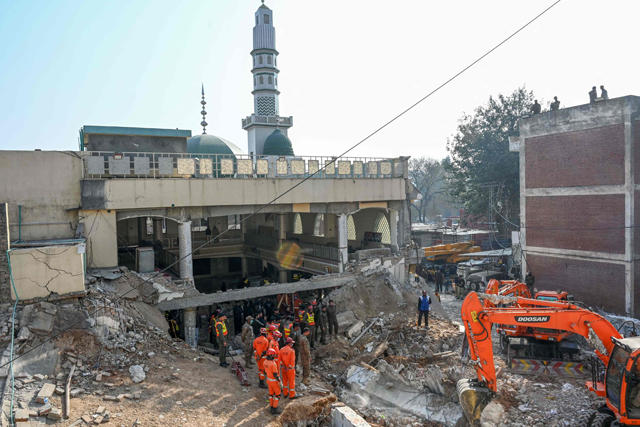You are here
Suicide blast kills at least 44 at Pakistan political party gathering
By AFP - Jul 31,2023 - Last updated at Jul 31,2023
PESHAWAR, Pakistan — At least 44 people were killed and dozens more wounded on Sunday by a suicide bombing at a political gathering of a leading Islamic party in northwest Pakistan, officials said.
The blast targeted the Jamiat Ulema-e-Islam-F (JUI-F) party — a government coalition partner led by an influential firebrand cleric — as hundreds of supporters congregated under a canopy in the town of Khar, near the Afghan border.
“The tent had collapsed on one side, trapping people who were desperately attempting to escape,” said Abdullah Khan, who tried to help the victims.
“There was utter confusion, with human flesh, limbs, and body parts scattered throughout the area, alongside lifeless bodies.”
Sabeeh Ullah, a 24-year-old party supporter who had his arm fractured by the blast, said the scale of injuries was horrifying.
“I found myself lying next to someone who had lost their limbs. The air was filled with the smell of human flesh,” he told AFP by phone.
As the toll kept rising, Riaz Anwar — the health minister for Khyber Pakhtunkhwa province — told AFP late Sunday 44 people had been confirmed killed and over 100 wounded.
“It was a suicide attack, with the bomber detonating himself in close proximity to the stage,” he told AFP.
Images from the blast site circulating on social media showed bodies strewn around the scene, and volunteers helping blood-soaked victims to ambulances.
Pakistan’s national assembly is due to dissolve in the next few weeks ahead of elections expected in October or November, and political parties are already preparing to campaign.
The blast coincides with a visit to the country by a senior delegation of Chinese officials, including Vice Premier He Lifeng, who arrived in the capital Sunday evening.
Local Daesh active
No group has claimed responsibility for the attack, but the local chapter of the Daesh group has recently carried out attacks against JUI-F.
Last year, Daesh said it was behind violent attacks against religious scholars affiliated with the party, which has a huge network of mosques and madrassas in the north and west of the country.
The militants group accuses JUI-F of hypocrisy for being an Islamic group while supporting hostile governments and the military.
The party’s leader, cleric Fazlur Rehman, started political life as a firebrand Islamist hardliner but has softened his public image over the years in a bid to forge alliances with secular parties on the left and right of the spectrum.
With the ability to mobilise tens of thousands of madrassa students, his party never musters enough support for power on its own, but is usually a key player in any coalition.
Pakistan has seen a sharp rise in militant attacks since the Afghan Taliban surged back to power in neighbouring Afghanistan in 2021.
Pakistan’s home-grown Taliban group, Tehreek-e-Taliban Pakistan, has largely directed its campaign against security officials, including police officers.
In January, a suicide bomber linked to Pakistan’s Taliban blew himself up in a mosque inside a police compound in the northwestern city of Peshawar, killing more than 80 officers.
The militant assaults have been focused in regions abutting Afghanistan, and Islamabad alleges some are being planned on Afghan soil — a charge Kabul denies.
Pakistan was once plagued by almost daily bombings, but a major military clearance operation in the former tribal areas starting in 2014 largely restored order.
The seven remote districts that border Afghanistan, of which Bajaur is one, were later brought under the control of Pakistani authorities after the passage of legislation in 2018.
Analysts say militants in the former tribal areas have become emboldened since the return of the Afghan Taliban.
One security analyst suggested Sunday’s attack was more likely linked to the election rather than having a sectarian motive.
“This is part of terrorism violence that seems to be ramping up in Pakistan ahead of elections to create a sense of instability that could eventually lead to a delay in the elections,” said Imtiaz Gul, executive director of the Centre for Research and Security Studies.
Afghan government spokesman Zabihullah Mujahid condemned the attack in a statement, adding Kabul “shares its deepest condolences with the affected families”.
Related Articles
PESHAWAR, Pakistan — The death toll from a suicide attack at a Shiite mosque in northwest Pakistan rose to 62 overnight as police said on Sa
QUETTA, Pakistan — More than a dozen people were killed in an overnight battle between Pakistan paramilitary troops and militants who storme
PESHAWAR, Pakistan — A suicide blast at a mosque inside a Pakistan police headquarters was a targeted revenge attack, a police chief said on
















